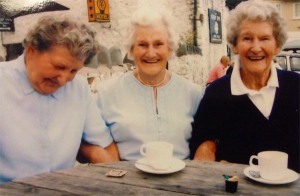 I don't know about you but I love the ghost stories that abound on British TV at this time of the year, spooky little tales that make me shiver and look around into the dark corners of the room (but somehow never stop me from sleeping).
I thought this New Year you might like to read one of the spooky episodes from my own dual-time ghostly romance, MOONSHADOWS. This scene starts with my present-day heroine, Jez, in the churchyard, looking for the grave of her ancestor.....
I don't know about you but I love the ghost stories that abound on British TV at this time of the year, spooky little tales that make me shiver and look around into the dark corners of the room (but somehow never stop me from sleeping).
I thought this New Year you might like to read one of the spooky episodes from my own dual-time ghostly romance, MOONSHADOWS. This scene starts with my present-day heroine, Jez, in the churchyard, looking for the grave of her ancestor.....
…Jez walked amongst the gravestones, scanning them
rapidly for Sarah’s name. It was not easy, for they were very worn, some almost
illegible. She found it at last on a grey slab in a very damp and shady corner.
It was the only headstone in that area. The granite-grey stone was covered in
ivy, which Jez pulled aside. She traced her fingers over the worn lettering,
whispering the words as she deciphered them.
“Here lieth
Sarah Appleton Methven, beloved mother of Thomas and Jennifer…died in the year
of our lord 1780, aged 57 years… Judge not…”
Jez went back to the little bench and sat down,
staring at the headstone and thinking hard. “Beloved mother”—did that mean she
had been reunited with her children before her death? Or had they merely been
informed that she was dead and had done their duty by her? How could she find
out?
“Yer, what’re you doin’? That ivy’s protection for
that there ’eadstone!”
She swung around to see who was shouting. An old man
was approaching, shuffling towards her. He wore a pair of faded moleskin
trousers tucked into his thick woollen socks, a pair of very muddy brown boots
and an old tweed jacket tied at the waist with string. As he drew closer, she
became aware of a shiny red nose and a pair of bloodshot eyes set beneath bushy
grey brows—all that was visible between the peak of his flat cap and the muffler that covered his
chin.
“I’m sorry, I meant no harm—”
“Harm? No, that’s what they all say,
coming in ’ere with their cameras and notebooks, pulling aside the plants
that’s protected these ’ere stones since time long gone by. Records, pshaw! We
don’t need no records. It’s all ’ere, in the stones.”
“No, no, I’m not recording anything.
I was looking for Sarah Methven.”
“Lady Sarah?” He stepped up to peer
short-sightedly at her. “Oh, so you’m back then!”
She laughed. “No, I’ve never been
here before.”
The old man stared at her.
“You ain’t wantin’ to wreck the
grave?”
“No of course not. I think she might
be a relative of mine. Who are you? Do you look after the graves?”
“In a manner of speakin’ you might
say that.” The old man came to sit beside her and Jez shifted along the bench,
leaving a clear gap between them. Even so there was a strong smell of tobacco
emanating from his person.
“Then why don’t you keep the weeds
cut in this corner? It’s rather a mess, isn’t it?”
He tapped his nose with one grimy
finger. “Protection.”
“Protection?”
“Protection from ’er.”
It was becoming apparent to Jez that
her companion was not quite sane. She edged away to the end of the bench.
“She might come back, see, at any
time and I’s got to be ready. I mustn’t let her harm Lady Sarah. That’s my
job.”
“And who gave you this job?”
He sniffed loudly.
“Me old man. Passed down, y’see, from
father to son. It was ’is father’s job before and ’is granfers.” He took out a
pipe and battered tobacco pouch and cast a bleary eye at her. “Have you time
for a story, miss?”
Fascinated, Jez nodded.
“Long time ago it was, see, ’underds
of yers. Lady Sarah lived in the village then and my old relative knew ’er.
They say that everyone knew ’er. Lovely lady, kind and gentle, visiting the
sick and comin’ to church every Sunday—never missed, they say. Then when she
died there was some argument about where she was to be buried. Her son wanted
to take her back to the family vault, but the lady’s own wishes was to be
buried ’ere, where she lived so long. Any road, my relative, he was gravedigger
then, see? Dicked in the nob, they said he was, but he was never so daft that
’e couldn’t find hisself a good woman to be ’is wife and provide for his
family—and the proof is that we is still here, after all these years.” He lit
his pipe and drew on it steadily, silently contemplating his impressive
lineage.
“So—so your relative buried
Sarah?”
“Aye, that’s it. Well, ’e dug the
’ole, anyway. Parson did the burying, o’ course. Whole village turned out, so
they said, but then, just as the earth is being filled in and the mourners is
about to go, a coach rolls up—great gilded thing with a crest on the side, and
a madwoman gets out and runs to the grave where she starts cursing poor Sarah’s
name and swearing she’ll have no rest. Well, Parson and Sarah’s son ’as to
restrain the poor woman, for she looks set to pull Sarah from her very coffin,
crying all the time that our poor departed lady had stolen her husband, that
she should not be buried with decent folk being as how she was a—”
He coughed. “My relative did pass on
the words she used, miss, but I’ll not use ’em in front of a young lady.
Anyhow, a servant comes and carries the poor distraught lady away, she
screaming all the while that she’ll be avenged on Sarah. Well, you can imagine
that Parson and Sarah’s family was real cut-up about all this, the ladies was
crying and Parson shakin’ his head. The upshot is that poor Sarah’s son comes
up to my relative and slips him a purse. Asks him very gentlemanlike if he
would be kind enough to watch over his mama’s grave, since he would not be able
to do so hisself. Just in case the lady came back, see? Now my relative, being
a God-fearing Christian who knows his duty, would willingly have looked after
the poor soul’s last resting place and not asked a penny for doing so, but the
gentleman insisted.
‘Keep the purse, my good man,’ he
says, very civil-like, ‘and put it to some good use.’ So when my relative goes
’ome and looks in the purse he finds it full of gold pieces! Well, ’is wife—who
is by way of blood and nature also my relative, of course—his wife she was in a
bad way at that time, on her third confinement, so he uses the gold to pay the
doctor to attend ’er, rather than the gin-sodden old midwife, and praise be if
she wasn’t delivered of a bouncing baby boy that my distant relative promptly
christens Thomas, in honour of poor Sarah’s son!”
The old man drew on his pipe again,
then continued proudly, “And ’is father give the task of watching over Sarah’s
grave to that Thomas, a solemn duty that ’e carried out faithfully all his days
and passed on to ’is own son Thomas, and so on down the line of my relatives
until it comes to me, the present Thomas.” He ended, beaming at Jessica over
his muffler.
She felt that some response was
required. “That—that’s a wonderful story, Thomas. And have you ever had to
protect the grave?”
“No, never.” He shook his head sadly.
“They say the old madwoman died soon after, bless her poor soul. We’ve
continued our vigil, man and boy, like we promised, but no-one comes to this
corner, save yourself, and the dook, of course.”
“The—the duke?”
“Well, some sort of lord, he is. He
comes every so often, to sit over the grave for a few hours. Always wears his
blue velvet coat he does, and ’is sword. Was me great-granfer which named him
dook, course we don’t know who he is really—”
“Hang on! Your great-grandfather saw
him?”
“Yes, he did that, miss. Many a
time.”
The hair on the back of Jessica’s
neck prickled.
“But—your great-grandfather must have
been dead for…”
“Nigh on seventy year now. He passed
on when I was a babe.”
Jez dug her hands into the pockets of
her coat to stop them shaking. “Then this, this duke that you see—”
“Oh he’s a spirit, miss. What you
might call a ghost. We’ve seen ’im off and on for over a hunderd yers.” The old
man chuckled. “Surely, miss, you don’t think I’m mad enough to believe a man
can live for all that time? That would be crazy! No, he’s a ghost, right enough,
it’d be plain daft to think anything else.”
“Yes,” she agreed faintly. “Yes, I
suppose it would.”
“Well now, Thomas, what are you doing
here, keeping this young lady sitting about in the cold?”
Jez jumped up from the bench at the
sudden voice, relaxing only when she saw it was the vicar bearing down upon
them through the gloom. He was beaming at them, but clearly intent upon leading
her away. She went with him willingly, after muttering goodbye to the old man,
who remained sitting on the bench to finish his pipe.
“Poor old Tom,” said the vicar
comfortably. “Has he been telling you his tales?”
“Yes, he was telling me about his
relatives.”
“Take no notice. He’s as mad as a
hatter. Runs in the family, of course, but he’s harmless enough. He likes to potter
around, so we pay him to cut the grass and do a spot of weeding around the
graves, and he does a reasonable job, generally, although nothing will make him
tidy up that far corner. Strange that. Did you find the stone you were looking
for, by the way?”
“Yes. Yes I did, thank you.
I—um—Thomas said there was a—a ghost in the churchyard.”
“Did he? Well, maybe he’s right. I’ve
never seen it, but if Tom’s happy to believe it, we’ll let him carry on, shall
we?”
Silently, she nodded, hunching her
shoulders against the cold wind as they left the churchyard. The wind sighed in
the trees behind them.
Ah, Sarah.
* * *
Sleep well, and may 2014 bring you everything you wish for yourself
Melinda Hammond / Sarah Mallory
MOONSHADOWS by Melinda Hammond, Samhain Publishing
http://store.samhainpublishing.com/moonshadows-p-3955.html
New by Sarah Mallory for Feb 14,
LADY BENEATH THE VEIL - pub Harlequin Historical.

 This picture of my mum and her sisters, Nell and Kath was taken in Somerset, when they were all in their late eighties. We were spending a few days together at a hotel in Somerset. I have never got through so much brandy in my life. ‘Ooh, just another nip, ducky! Helps you to sleep, y’know.’ All three lived well into their nineties.
This picture of my mum and her sisters, Nell and Kath was taken in Somerset, when they were all in their late eighties. We were spending a few days together at a hotel in Somerset. I have never got through so much brandy in my life. ‘Ooh, just another nip, ducky! Helps you to sleep, y’know.’ All three lived well into their nineties. 






